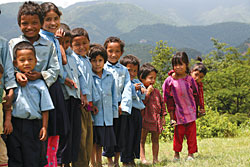 KIRAN PANDAY |
Today marks four decades of the United Nations Children's Fund (UNICEF) in Nepal, and twenty years since the United Nations Convention on the Rights of the Child came into force. These are anniversaries worth celebrating. When UNICEF opened its country office in Kathmandu in 1969, the situation of Nepal's children was among the worst in the world.
In 1970 Nepal had the 12th highest child mortality rate in the world. By last year, we had moved ahead of 50 other countries, to rank 62nd. During this period the under-five mortality rate went down by nearly 80 per cent, from 250 to 51 per 1000. Four decades ago, 400,000 children were born every year, but 100,000 of them died before reaching their fifth birthday. Last year, 732,000 children were born, but less than 40,000 died. Forty years ago, barely a quarter of school-age children went to primary education. Today 90 per cent of children enroll in primary school, including a majority of girls.
That certainly is progress. It is all the more remarkable that Nepal made great strides in reducing the number of child deaths even in the middle of the violent conflict of the last decade. In our lifetime, we have seen dreaded diseases like smallpox and polio eradicated, deaths due to measles drastically reduced, goiter disappear, and immunisation services for children becoming virtually universal.
The children of Nepal today are healthier, more educated, and more knowledgeable about the world than in any previous generation.
Both 1990's first Jana Andolan, which ushered in democracy, and the coming into force of the UN Convention on the Rights of the Child (CRC), gave great impetus to the cause of children. Whereas earlier programs for children were designed to be needs-based, sometimes even as a charitable response to the plight of children, a rights-based approach came into vogue following the advent of democracy and application of the CRC.
While UNICEF continued to help tackle some of the age-old problems of illness, illiteracy and malnutrition in Nepal with some success, three new problems surfaced in the past two decades: HIV/AIDS, trafficking and abuse of children on a massive scale, and a terrible civil war that led to new forms of violence and exploitation of children. But through its innovative, dynamic approaches to complement its traditional programs in health and education, water and sanitation, UNICEF has been able to address these challenges. In doing so, UNICEF has become a household name, a true child-friendly UN presence in Nepal.
As we look ahead, I see a bright future for the children of this country, provided we Nepalis are able to overcome our
self-destructive orgy of hyper-politicisation and violence and adhere to the overarching principles of the CRC. These principles are non-discrimination, the best interest of the child, the right to survival and development, and respect for the views of the child.
We must therefore ensure that in education, for instance, we are not satisfied by high average enrollments but go for universal and equitable progress, with special measures for children who are likely to be disadvantaged, such as Dalits, those from certain indigenous communities and girls.
We may have reduced child mortality, but death is only the tip of the iceberg. We must invest heavily in maternal, newborn and child health especially to combat our unacceptably high levels of child malnutrition, and to promote early child development. After all, whether a child will grow to live up to his or her full human potential is largely determined in the first few years of a child's life, before the child enters school.
Young people are amazingly resourceful and we have seen time and again that child participation works. Participation is a passport to belonging, so let us give our young people their place in shaping their lives and a more democratic, peaceful and prosperous New Nepal.
Finally, in everything we do, if we are not sure what the right way forward is, we should always ask the question: is it in the best interest of our children?
Kul Chandra Gautam is a former Deputy Executive Director of UNICEF and UN Assistant Secretary-General.
READ ALSO:
Helping families afford education - FROM ISSUE #441 (06 MARCH 2009 - 12 MARCH 2009)
Children of the revolution - FROM ISSUE #439 (20 FEB 2009 - 26 FEB 2009)
Children in a minefield - FROM ISSUE #411 (01 AUG 2008 - 07 AUG 2008)
The Karnali's children - FROM ISSUE #319 (20 OCT 2006 - 26 OCT 2006)



